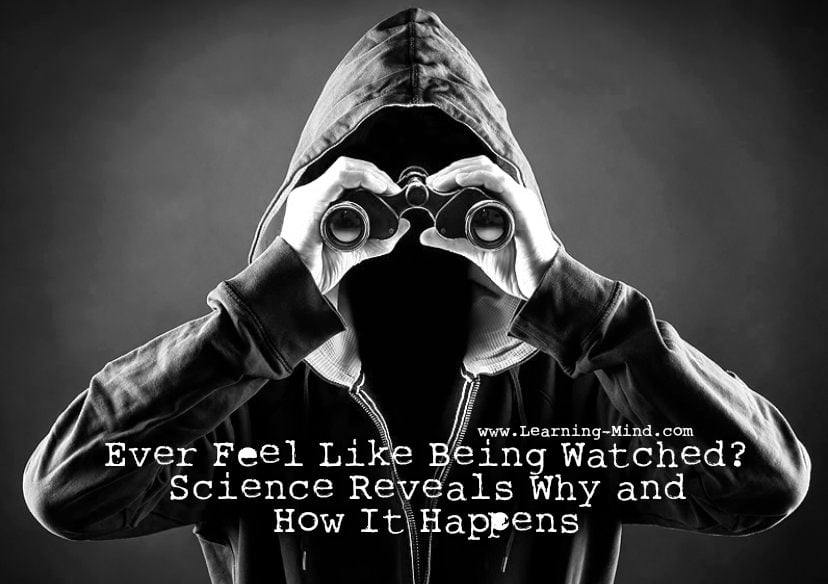
Ever had a sudden tingling feeling at the back of your neck? You have an unnerving sensation of being watched. Nonetheless, when you look around, there’s no one there?
It’s unsettling to think that someone is watching you. Some of you might put it down to a sixth sense, or type of psychic ability. However, there is a scientific explanation. And it all lies within the brain.
Has ‘a feeling of being watched’ ever been studied? Well, the subject piqued the interest of one scientist. Dr. Edward Titchener worked in the late part of the 1800s and was one of the first to study this phenomenon.
He said:
“We are all of us more or less ‘nervous’ about our backs.” Edward Titchener
In other words, we worry that someone looks at us. Think about it. We don’t have laser eyes that penetrate another person’s skin. We can’t cause another person to feel something simply because we are looking at a part of their body.
However, start thinking about a part of your own body. You’ll soon have a heightened awareness of that part of the body. It’s now something you were previously unaware of. Therefore, if you feel like you are being watched, it has to originate from your own mind or brain.
How many times have you heard the phrase ‘the eyes are the windows to the soul’? Turns out there’s a good reason for this, and it’s all to do with our survival.
Human eyes are different from nearly all other species in that they have a much larger white area surrounding the iris. This is so that we can see when the eyes are moving in different directions. Our eyes are designed so that we notice a person’s gaze.
Not only that, but our brain dedicates a huge neural network all just to process where a person looks. In fact, studies showed that even newborn babies prefer to look at photographs of people with their eyes open. So the evidence is clear, eye movements are important. But in what context?
It has to do with evolutionary survival. Paying attention to where people are looking will alert you to oncoming danger. Thousands of years ago, humans were concerned with survival. So a quick glance off to the distance could signal that a threat was approaching.
Remember, our language would have been pretty rudimentary in those days. It is fair to say that eye movements would have been an extremely useful tool for communicating. Now we have established that the direction of a person’s gaze was particularly important to our survival. This explains why it bothers us so much when someone stares at us.
So we can assume that the direction of a person’s gaze was important, thousands of years ago, to our survival. But how does that explain a feeling of being watched in the present day? Well, we still use our eyes as an important tool for communicating. Even though the threats might not be as dramatic as a fight with a sabre-toothed tiger.
On the other hand, the eyes still tell us a lot about what someone is thinking. A person staring at you could signify a threat and if it is, you’re not going to want to miss it. So, if you’re not sure, it might be easier to assume a person is looking, to check out the potential of a threat.
Another reason why people stare is that they are checking out a potential partner. Either way, you don’t want to overlook this eye contact as it could represent a future love interest or a beating.
According to the ‘Spotlight Effect’, we have a tendency to think that everyone notices our behaviour. Of course, to ourselves, we are the most important person on the planet. Therefore, it stands to reason that people will want to look at us. What we fail to realise is that everyone is important in their own right.
Studies prove that when it comes to eye contact, we do think everyone is looking at us. Even when a person is wearing sunglasses and we can’t see where they are looking, we assume we are the target.
So going back to Titchener, who said we are all afraid of our backs, or something like that. If we think a person wearing sunglasses is looking at us, it’s not surprising that we assume everyone else does. And this is where the feeling of being watched comes from. We think someone is looking at us, even though the chances they really are not.
Finally, if you don’t agree with any of the above, I’d like to offer you some respite.
One study took a patient, known as TN, who was cortically blind. This meant he had an injury to the part of his brain that dealt with vision. His eyes were fine, it was his brain that could not process the images sent from the eyes. The study used an assortment of pictures of people’s faces. Faces in some of the pictures looked straight ahead, in others they turned away. TN couldn’t actually see the pictures.
However, pictures with faces turned at him caused a spike in brain activity associated with threats and arousal. As TN demonstrated, clearly we don’t need to actually ‘see’ to feel threatened. It is quite possible that our other senses may have a role in detecting a threat, outside of our vision.
So, next time you are being watched, ask yourself, do you worry a lot or do you pay undue attention to others? Or, could it be that you’re a little bit self-centred, just like the rest of us?